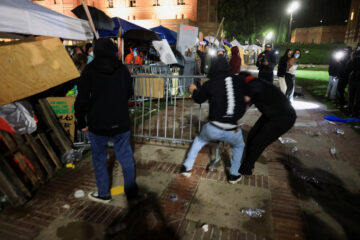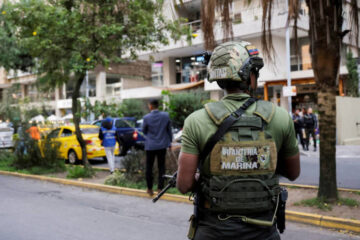Thai junta leader appointed PM by hand-picked parliament
Reuters
Thailand\’s coup leader General Prayuth Chan-ocha was appointed prime minister on Thursday by a legislature he hand-picked, giving the army chief a veneer of legitimacy even while the military presses on with efforts to silence its critics.
The army seized power on May 22 in a bloodless coup following six months of sometimes deadly street protests that contributed to the ousting of Prime Minister Yingluck Shinawatra, whose populist government was opposed by the Bangkok royalist establishment.
Although Prayuth\’s appointment paves the way for an interim government to be set up in the coming weeks, power will remain firmly in the junta\’s hands. The general has said he plans to press ahead with a year of political reforms before a new election that he said will take place by late 2015.
"It is designed to give him the power to run the country according to the law. The premier position will give him legal power in the Thai governance system," Gothom Arya, a lecturer in human rights studies at Mahidol University, told Reuters.
The nomination comes as no surprise – the National Legislative Assembly (NLA) that chose Prayuth is largely considered little more than a rubber stamp parliament tasked with enacting sweeping reforms under the army\’s watch.
The 60-year-old Prayuth will retire as army chief in September but will stay on as head of the junta, formally known as the National Council for Peace and Order. His appointment will need to be endorsed by Thailand\’s king.
In the weeks leading up to the coup Prayuth denied rumors that the military was planning to take control, but a Reuters report in May revealed the army had a plan ready that ran through various scenarios and how the military should respond.
Yingluck, the sister of self-exiled former Prime Minister Thaksin Shinawatra, had already been forced to step down on May 7, after a court found her guilty of abuse of power, but the army said its putsch to remove the remnants of her government two weeks later was necessary to restore order.
Prayuth, who was not present at Thursday\’s vote in the legislature, has said he will hand over power once a three-phase roadmap of reconciliation, an interim government to oversee reforms and elections is complete.
Moments after his appointment Prayuth, who was inspecting troops at an army camp in Chonburi province south of Bangkok, was asked by reporters whether he had heard the news.
"I didn\’t know I had been asked to join," Prayuth said, shaking his head, adding: "First, I want the country to move on."
Since launching the coup, Prayuth has displayed signs of authoritarianism. A draft 2015 fiscal budget was approved on Monday in a unanimous vote, with only three abstentions by the NLA president and deputies according to convention.
"Nobody had any problem. Nobody disagreed," Prayuth said after the vote on Monday.
Australia, the United States and the European Union downgraded diplomatic ties with Thailand after the coup and western diplomats Reuters spoke to said the appointment amounted to little more than a public relations exercise.
"The prime minister title is just a cosmetic change and the nomination is not unexpected," said one Western diplomat in Bangkok, who declined to be named.
"Prayuth is a soldier and not a democratically elected politician and Western nations will continue to press Thailand for progress toward free and fair elections. Right now, we are more concerned about Thailand\’s human rights record."
The army detained scores of politicians and activists following the coup. Most have since been released although the army has yet to release official figures on the total number of people summoned, detained and released.
An opposition activist has alleged she was tortured in military custody. The military has denied the allegations, which it said were "100 percent fabricated".
Thailand has been bitterly divided for years between supporters of Yingluck and her brother Thaksin, a telecoms billionaire who was himself ousted by the army in 2006, and the traditional establishment in the capital and the south.
Many of Prayuth\’s reform plans echo demands made by the anti-government protesters who hounded Yingluck and played a hand in her downfall. They wanted the electoral system to be redrawn to eliminate the influence of Thaksin.
Since taking power, the junta has purged many officials linked to Thaksin in the civil service and the police force.
An outspoken leader, Prayuth became commander of the First Army Region, which oversees Bangkok and the central plains, in 2006 and became commander-in-chief of the army in 2010.
Mahidol University lecturer Gothom said it was hard to predict what Prayuth would do next.
"If he doesn\’t respect the timing of reforms, interim government and elections then we will be in trouble," he said.
Source: Reuters
[do_widget_area inner_adsbar]











